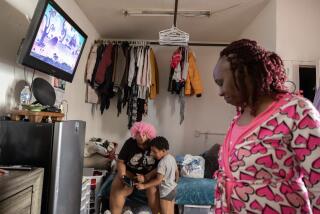Plumbing Problems at Iraq Site Spur Wider Contractor Review
- Share via
WASHINGTON — A special inspector general said Thursday that he planned to review all of the Iraq building projects overseen by Pasadena’s Parsons Corp. in the wake of severe plumbing problems that have surfaced at Baghdad’s new police academy.
Sewage is seeping through the floors at the academy, and in one of the buildings “the water has been dripping at such a rapid rate that the Baghdad Police College director refers to this room as the ‘Rain Forest,’ ” the auditors said in a report delivered to Congress by Stuart W. Bowen Jr., the special inspector general for Iraq reconstruction.
“It boils down to a lack of oversight,” Bowen told lawmakers.
The blistering report follows earlier criticisms of Iraqi building projects overseen by Parsons. The privately held construction and engineering firm and its partners have been awarded contracts for police stations, health clinics, prisons and other facilities that are potentially worth $2 billion or more.
Parsons executives have noted in the past that the ever-present threat of violence in Iraq has made its work more difficult. In a statement Thursday, Parsons said that once the problems were pointed out in July, the firm directed its Iraqi subcontractor to fix them.
“The subcontractor currently is changing out the pipes at no cost to the U.S. or Iraqi governments,” said Erin Kuhlman, vice president of corporate relations, adding, “Parsons is proud of our brave men and women who have performed extremely well under very difficult and dangerous conditions in Iraq.”
Parsons has relied on local Iraqi contractors to carry out much of its work in Iraq, including at the police academy, a $75-million project that is considered to be a symbol of U.S. efforts to help reestablish peace and security in Iraq.
According to the audit, leakage from plumbing was so severe at the academy that it threatened the structural integrity of the floors in eight dormitories intended to house as many as 2,800 police cadets.
The audit followed site visits to the police academy in August and September. It found that inferior plumbing techniques, methods and materials were causing a continual spread of water and human waste throughout the three-story buildings, from the top floor to the ground floor.
“For example, we witnessed a light fixture so full of diluted urine and feces that it would not operate,” the auditors said in the report, which included photographs of the malfunctioning light and stained ceiling tiles. “As we continued our assessment throughout the second-floor bathroom, we identified evidence of large quantities of diluted urine dripping from the top floor down through the ceiling. The urine was so pervasive that it had permanently stained the ceiling tiles.”
Parsons completed its work on the police academy in the spring, the company said Thursday, adding that Iraqi officials inspected the facility during April and May and accepted the work. Police and cadets then moved in.
At a hearing Thursday, Rep. Thomas M. Davis III (R-Va.), chairman of the House Committee on Government Reform, lamented the poor track record of U.S. building projects in Iraq.
“Poor security, an arcane, ill-suited management structure and a dizzying cascade of setbacks,” he said.
“The committee is, of course, always concerned when there is defective workmanship under a government contract,” said David Marin, the panel’s staff director, though he noted that Parsons was addressing the problems through its subcontractor. “We will continue to follow this project closely to ensure that the Corps of Engineers takes appropriate remedial action.”
Rep. Henry A. Waxman (D-Los Angeles) emphasized the stakes in properly handling the police academy project.
“What could be a more important symbol than getting police trained for security, and buildings which will give them a boost?” Waxman asked.
jonathan.peterson@
latimes.com
Reuters was used in compiling this report.
More to Read
Sign up for Essential California
The most important California stories and recommendations in your inbox every morning.
You may occasionally receive promotional content from the Los Angeles Times.










